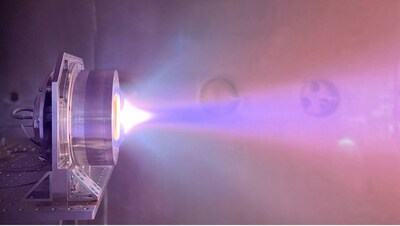Source prnewswire
DARPA Awards Phase Four $14.9M Contract to Develop Air Breathing Electric Propulsion for Very Low Earth Orbit Operations
HAWTHORNE, Calif., April 4, 2024 /PRNewswire/ -- Phase Four, a leading provider of next generation electric propulsion (EP) solutions for satellites, was awarded a $14.9M contract by the Defense Advanced Research Projects Agency (DARPA) to deliver an "air-breathing" EP system to enable extended satellite operations in Very Low Earth Orbit (VLEO), at altitudes as low as 90-450km. The award is part of DARPA's Otter program, which aims to develop, demonstrate, and collect on-orbit data for "air breathing" electric propulsion technologies that will harvest ambient low-density air as propellant, enabling extended satellite operations at VLEO altitudes. The Otter program will culminate in a long duration "orbiting wind tunnel" spaceflight demonstration, characterizing the performance of the "air-breathing" EP system in the orbital environment. The award is part of DARPA's Otter program, which aims to develop, demonstrate, and collect on-orbit data for "air breathing" electric propulsion technologies that will harvest ambient low-density air as propellant, enabling extended satellite operations at VLEO altitudes. The Otter program will culminate in a long duration "orbiting wind tunnel" spaceflight demonstration, characterizing the performance of the "air-breathing" EP system in the orbital environment.DARPA's Otter program will leverage Phase Four's innovative core technology, the radio frequency thruster (RFT), which is inherently propellant agnostic compared to legacy electric propulsion systems which rapidly degrade when exposed to non-traditional propellants. This feature uniquely enables the RFT to operate on the low-density air harvested in the VLEO environment. The Otter program will build upon a previous effort with DARPA that developed a proof-of-concept thruster prototype for novel, low-cost propellants The Otter program will build upon a previous effort with DARPA that developed a proof-of-concept thruster prototype for novel, low-cost propellants"Phase Four is proud to continue supporting DARPA's efforts to advance in-space propulsion capabilities," said Umair Siddiqui, Phase Four's President and CTO, and Principal Investigator for the effort. "Phase Four has designed and built electric propulsion systems that have been launched on 9 satellites with over 5,300 days of on-orbit flight heritage since the company was founded. We're thrilled to bring that heritage, experience, and innovation in electric propulsion systems to the Otter program We're thrilled to bring that heritage, experience, and innovation in electric propulsion systems to the Otter program"With the addition of the Otter program, Phase Four's portfolio of propulsion capabilities will now span the totality of the space domain, from near-space to deep space," added Jason Wallace, President of Government Programs at Phase Four. "We look forward to working closely with DARPA to unlock sustained missions in VLEO, which will increasingly become a critical operational environment for national security as traditional orbits become congested and contested."About Phase FourPhase Four is a disruptive provider of next generation electric propulsion (EP) solutions for small satellites. The company was founded in 2015 to address the demands of the rapid proliferation of satellite constellations and to accelerate the advancement of its radio-frequency thruster (RFT). The Phase Four RFT represents a revolutionary new architecture that realizes lower cost, mass-manufacturability, miniaturized power electronics, and propellant agnosticism over incumbent technologies, without compromising performance. In 2021 Phase Four's Maxwell turn-key propulsion system achieved flight heritage and is now being regularly utilized by small satellite operators. Learn more at www.phasefour.ioioDistribution Statement A. Approved for public release: distribution unlimited.SOURCE Phase Four


No Comments